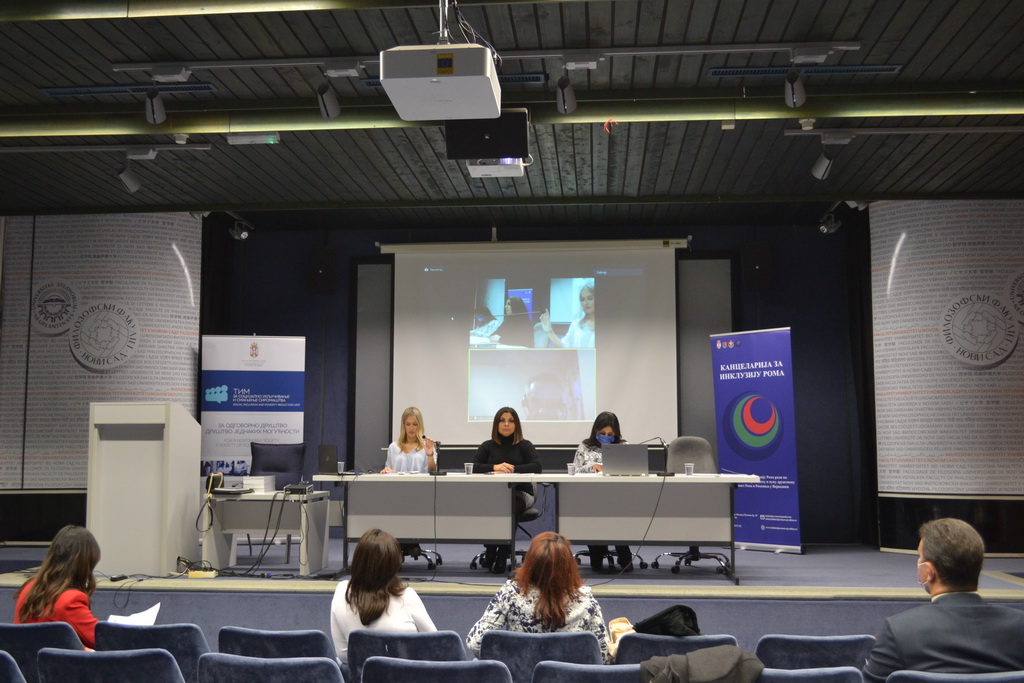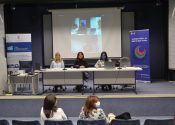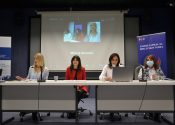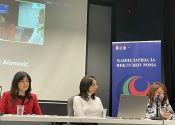 The Social Inclusion and Poverty Reduction Unit of the Government of the Republic of Serbia, in cooperation with the Faculty of Philosophy in Novi Sad and the Roma Inclusion Office of AP Vojvodina, held a promotion of the book Romology at the Faculty of Philosophy in Novi Sad on 3 December 2021. Romology is a book by Rajko Đurić, a renowned advocate for the rights of Roma, writer, publicist, and one of the foremost experts on the history of the Roma people, culture and language.
The Social Inclusion and Poverty Reduction Unit of the Government of the Republic of Serbia, in cooperation with the Faculty of Philosophy in Novi Sad and the Roma Inclusion Office of AP Vojvodina, held a promotion of the book Romology at the Faculty of Philosophy in Novi Sad on 3 December 2021. Romology is a book by Rajko Đurić, a renowned advocate for the rights of Roma, writer, publicist, and one of the foremost experts on the history of the Roma people, culture and language.
The Vice Dean of the Faculty of Philosophy Prof. Dr Milivoje Alanović said that projects of this kind deserve not only institutional support, but also full academic attention, with the end goal being a more just, balanced and happy society. “Through this book romology is acquiring its necessary theoretical and scientific framework. The book provides a multitude of information of a typological nature, with particularly important sections dedicated to culture, identity, history, principles of standardisation of the Roma language and stereotypical representations of Roma”, said Alanović and noted that the book is a valuable reminder of the need for studying all forms of Roma culture.
“Rajko Đurić was a great fighter for human rights and one of the initiators of the Roma movement that lives on worldwide”, said Ljiljana Mihajlović, Director of the Roma Inclusion Office of AP Vojvodina.
According to Dragana Jovanović Arijas, Manager of the Social Inclusion and Poverty Reduction Unit of the Government of the Republic of Serbia, this book was designed with the aim of serving as a textbook to be studied in higher education. “In addition to scientific elements, the book provides insight into the history, culture and identity of Roma, that should primarily be known to youth from the Roma community, but also all interested citizens who wish that we know each other better and truly live together”, said Jovanović Arijas.
As explained by Marija Aleksandrović from the College of Vocational Studies for Educators “Mihailo Palov” from Vršac, the standardisation of the Roma language envisages 39 letters, eight cases, the Roma language does not have a neuter gender, and has articles that go with nouns. “The Roma language in Serbia was standardised in 2013, and professor Đurić proposed establishing institutions to nurture and develop the Roma language, along with scientific and professional journals, as well as a dictionary of the Roma language”, said Aleksandrović.
Mirjana Sulejmanović, a student at the Faculty of Technology of the University in Novi Sad, said that the book Romology provides a comprehensive insight into the challenges faced by Roma, but it is also stimulating for new research into all the cultures we live in. “I am proud to belong to a people that have fought for equality for centuries, I am motivated by our history and stimulated to fight for us to one day find a place under the sun that is ours”, said Mirjana.
“It was my extraordinary honour and pleasure to cooperate with professor Đurić”, said Slavica Denić, Coordinator for Roma Inclusion at the Social Inclusion and Poverty Reduction Unit of the Government of the Republic of Serbia. She said that the study of romology as an interdisciplinary science in faculties and colleges is extremely important since only knowledge can contribute to reducing stereotypes and discrimination. “The last part of this book is a small romological dictionary, containing the names of Roma who have left a trace in the history of humanity in their own way and in various segments of our lives”, concluded Denić.
 Government of the Republic of Serbia
Government of the Republic of Serbia


















 pdf [271 KB]
pdf [271 KB]
Leave a Comment